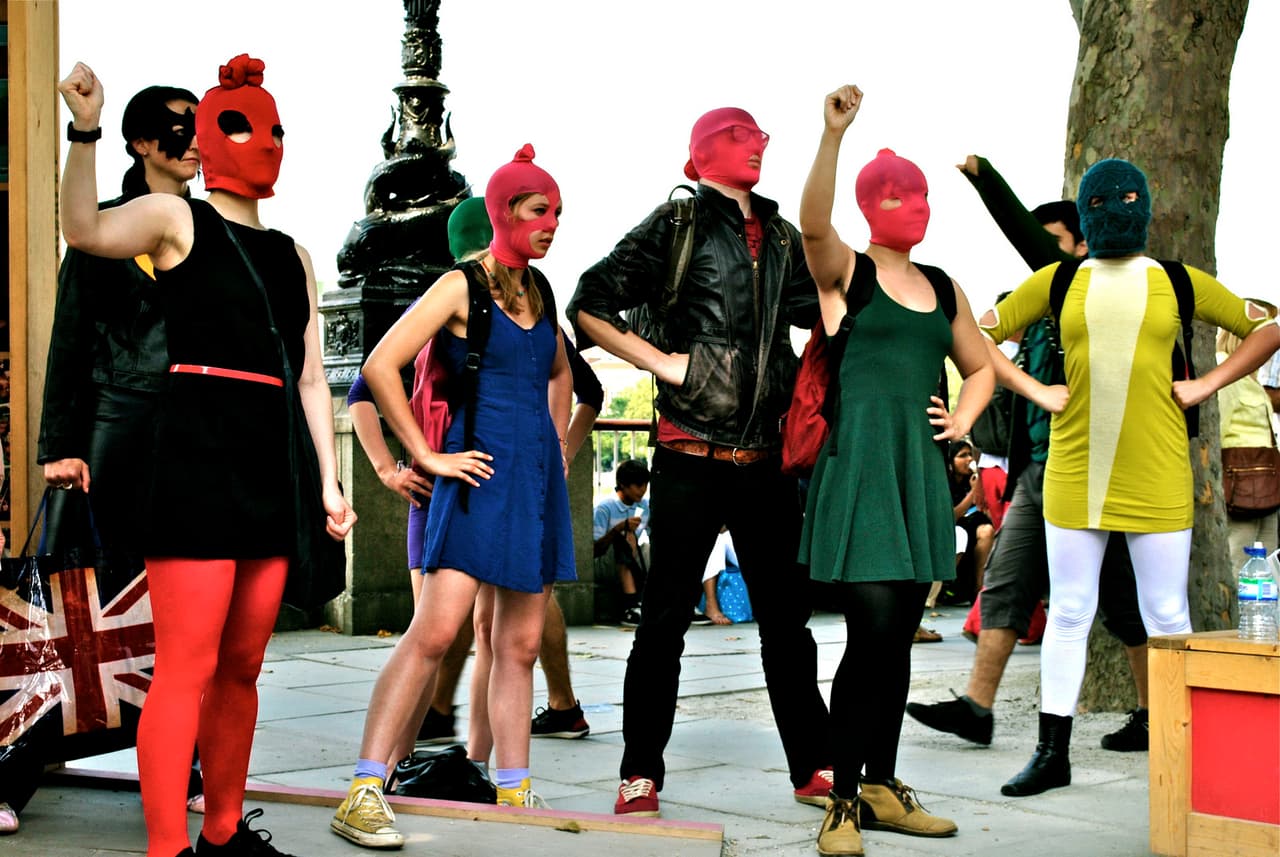
Pussy Riot: the cat’s out of the bag
A potent combination of righteous indignation, punk rock and neon headgear has transfixed the world during the Pussy Riot trial, which culminated in a guilty verdict today. The outcome was not wholly unexpected, the Russian judicial system has for years come down heavily on civil disobedience. But it’s been a while since the world has been so tuned in to the protest song.
Maria Alyokhina, 24, Nadezhda Tolokonnikova, 22, and Yekaterina Samutsevich, 29, were today convicted of hooliganism and handed jail sentences of two years each. The women are members of punk protest group Pussy Riot, known for their angry, political lyrics and anarchic shows. The band has performed its music in various high profile settings before, including Moscow’s Red Square, but it was their performance of an anti-Putin song in Christ the Saviour cathedral last February that led to their arrest.
The trial has garnered huge media attention setting blogs and Twitter alight. Even Madonna got aboard the Pussy Riot bandwagon donning the band’s trademark balaclava and inking their name onto her back at a recent concert in Moscow.
However, this is more than a one-off media moment. The case is an important moment for human rights and the bright balaclavas, young women and provocative band name has certainly made it all the more ‘newsworthy’.
The worrying truth, though, is that such draconian sentencing is far from an unusual occurrence in Putin’s Russia. As such, the trial, which comes almost 100 days into Vladimir Putin’s current stint as President, is a good opportunity to review other key moments in the Russian judiciary.
Crime and Punishment
While they may not have garnered the same attention, there have been several important trials during Putin’s time in power.
Currently there are another 13 protesters facing hooliganism charges much akin to Pussy Riot’s, each could face 10 years in prison. The protesters had participated in an anti-Putin demonstration in May, according to reports in the New York Times.
Putin’s government has recently cracked down on protests, increasing the maximum fine for unauthorised protests to 300,000 rubles (nearly £7,000.)
But hooliganism is not the only charge levied at those who have angered the state.
Last month anti-corruption activist Aleksei Navalny was charged with embezzlement by Russian investigators. If the charge leads to an arrest Navalny faces a potential jail sentence of up to 10 years.
The charges brought against the blogger and activist are hard to comprehend. Mr. Navalny is accused of organising to steal £300,000 worth of timber while acting as an adviser to the governor of the Kirov region of Russia.
The New York Times quotes Navalny voicing his disbelief at the charges. ‘What has happened is absolutely absurd and very strange, because they have completely changed the story behind the charge,’ Mr. Navalny said. ‘I cannot imagine how they will find a way to prove it. But they will, I guess.’
Separating Church and Art
The Pussy Riot trial has also been instrumental in highlighting the fragile tension between Russia’s Church and artistic community.
Back in 2010, when Putin was Prime Minister, art curators Yuri Samodurov and Andrei Yerofeyev were charged with ‘inciting hatred or enmity’ and ‘denigration of human dignity’ for organising a contemporary art exhibition at a centre in Moscow. They were fined 200,000 rubles (around £4,000) and 150,000 (around £3,000) respectively.
The prosecution argued that curators had included artworks that ‘were degrading and insulting to the Christian religion and to citizens professing that religion’. It was also argued that the exhibition was designed to incite hatred against Christians.
Human rights group FIDH have condemned the prosecution, stating that it exemplified ‘the grave and constant violation of freedom of expression in Russia.’
But it is not just artists who face prosecution. Two professors from Baltic State Technical University are currently serving 12 year sentences for spying and handing state secrets to China. Svyatoslav Bobyshev and Yevgeny Afanasyev reportedly had their sentenced handed down in a closed trial. The pair had given lectures at Harbin Engineering University in China. Bobyshev and Afanasyev have denied the charges and plan to appeal their sentences.
The Committee for the Defense of Scientists, a Russian organization, claimed the professors were the victims of ‘spy mania’. The couple were held for two years pre-trial.
Selective justice
Meanwhile, other potential criminals have avoided persecution. Back in June 2011 human rights activist Bakhrom Hamroev was severely beaten by two unidentified men, in his Moscow apartment. According to Human Rights Watch it was the second attack on Hamroev that year. Both attacks remain unpunished.
The next two years will be tough for Alyokhina, Tolokonnikova and Samutsevich, but in many ways they have achieved their goal: their protest song has rallied the world and focused attention on state repression in Russia. Their original blow has echoed in more protests, rippling out all around the world.
Indeed, the media attention given to the trial may have had some influence, the two year sentences are not as grave as they could have been. But while the riot may be on hold for these three women many others still face repression and persecution, enabled by the Russian judiciary.
Without the catchy name, the photogenic protagonists and the day-glo uniform, many others face their fate alone.
Header image: The Pussy Riot trial sparks a protest in London (Image: Flickr/Eyes on Rights)




